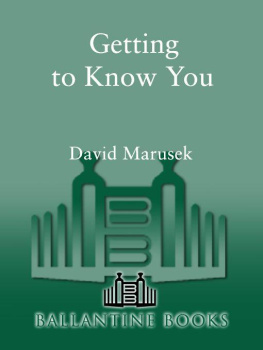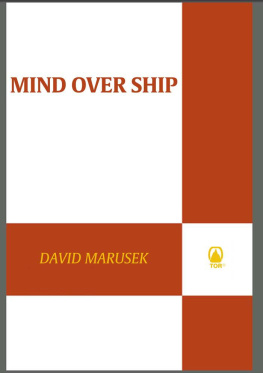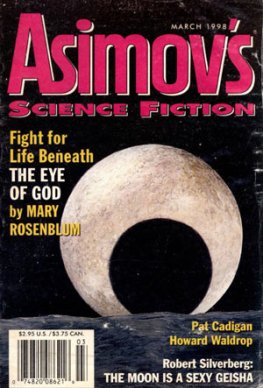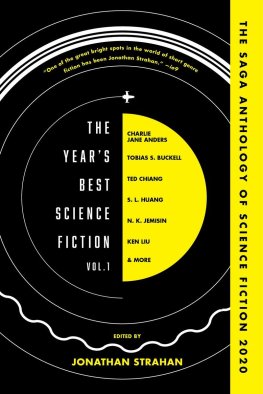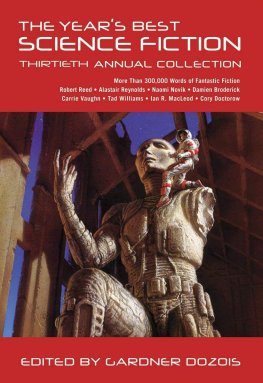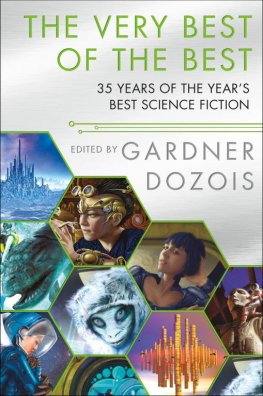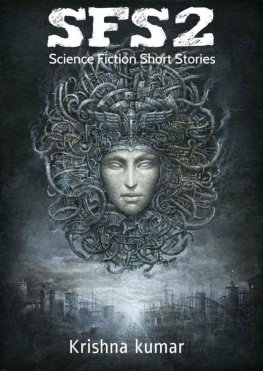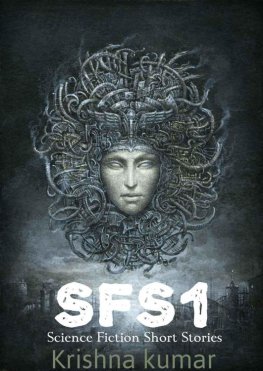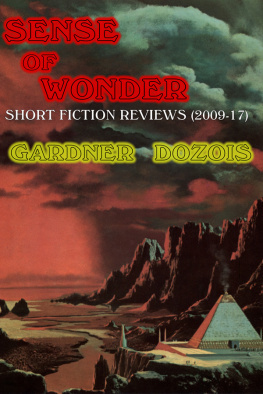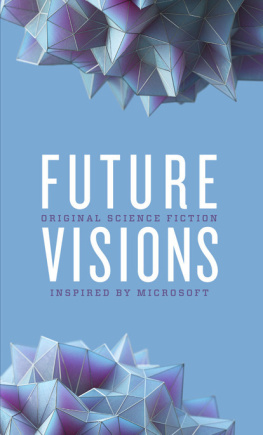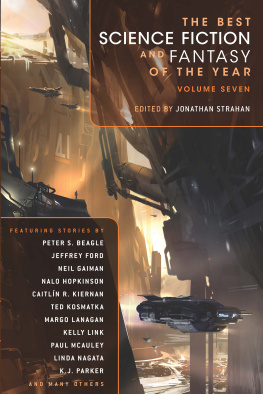
GETTING TO KNOW YOU
Contents
To brother Damian, who arrived last and left first.
Acknowledgments
It takes a social network to write a short story, at least in my case. Here are the people who over the years have generously read and critiqued my stories in draft form. Thank you all.
Chris Amies, Suzanne Bishop, Sandra Boatwright, Vincent Bonasso, Terry Boren, Gene Bostwick, Mark Bourne, Sue Ann Bowling, Lee Capps, Robert D. Carroll, Liz Counihan, Danny Daniels, Richard Garfinkle, Peter Garratt, Colleen Herning, Tom Hessler, Liz Holliday, Andrew Hooper, Ben Jeapes, Dixon Jones, Marion Avrilyn Jones, Paula Kothe, Sonia Orin Lyris, Alexandra MacKenzie, Tom Marcinko, Daniel Marcus, Holly Wade Matter, Todd Johnson McCaffrey, Joe Murphy, David Nickle, Andy Oldfield, Katherine Patrick, Kate Schaefer, Nisi Shawl, Gus Smith, Jim Snowden, Andrew Stephenson, Jackie Stormer, Robert Vamosi, Howard Waldrop, Cynthia Ward, Robert Weeden, Robert Wojtasiewicz, and Amy Wolf
Thanks to Sharron Albert for scouring this collection for typos, and special thanks to my editor, Gardner Dozois, for first ushering me into print.
GETTING TO KNOW YOU
Introduction
IT HAS ALWAYS STRUCK ME that reading short fiction is hard work and that most of the heavy lifting occurs in the first two pages. When we begin a new story, we are dropped on our heads into the lives of complete strangers, and its up to us to suss out, with few clues (title, dialog, action), just who these people are, what they are up to, who to root for, what it all means, and why we should even care.
Our reward, if the writer is any good, is emotional intimacy, suspense and release, a new insight, andonce in a great whilean epiphany that may change the way we experience the world.
But if reading short fiction is hard, believe me, writing it is many times more so. There is no end to the decisions, constraints, and sheer perniciousness of the short form. So why do I write short stories? Beyond the sheer joy of telling a good yarn, that is, and the boundless wealth and fame a story generates?
Writing short fiction started out as a means to an end for me. When I seriously began to write, I considered myself a born novelist. But I began my first novel without compass or map, and I spent six years writing myself in circles. So I turned to short fiction out of desperation, to actually finish something, to get my name in print and thus be able to call myself a writer.
It turned out to be a good move, as I seem to have a knack for the little buggers. I have even developed an affection for them, which I hope comes through to the reader.
Still, you wouldnt exactly call me a prolific short story writer, since I finish only about one a year. Now that Ive returned to novels, my reason for writing them has changed as well. Short fiction is a marvelous venue for practicing elements of craft and for trying out new things, and the pieces in this collection document my development as a writer. For example, how does one perform sex on the page? Or murder? These and other indelicate acts take a little practice to get right, and I find them easier to broach in the short form. Or, how does one weave together a whole believable world? In my caseone story at a time.
Here then are all of my science fiction short stories to date. Some heavy lifting may still be required, so roll up your sleeves and do a few knee bends before you start.
Some years ago, I became fascinated with the image of an artificial man whose mind is combed for memories before he is discarded as rubbish. He has been created as a wedding memento but has outlived the groom. Hes been in storage since the wedding day, and he pleads for the honeymoon hes never had. He pleads for one final hour with his new bride.
This artificial man became Benjamin in The Wedding Album, but during four years of revision, the storys focus shifted to the artificial bride, Anne. It became her story. Nevertheless, Bens desire for a final shining moment of sweetness served as my polestar through many rewrites. And in the end, its a story about running out of time.
Speaking of time, I once totted up the months I spent working on this story and was surprised to learn that it took me over a year to complete. Thats absurd, I thought. How can I ever hope to make a living as a writer if it takes me a year to write a short story? But The Wedding Album has become my most popular story thus far, and, like the wedding sims it portrays, it may well outlive me.

The Wedding Album
A NNE AND BENJAMIN stood stock-still, as instructed, close but not touching, while the simographer adjusted her apparatus, set its timer, and ducked out of the room. It would take only a moment, she said. They were to think only happy, happy thoughts.
For once in her life, Anne was unconditionally happy, and everything around her made her happier: her gown, which had been her grandmothers; the wedding ring (how cold it had felt when Benjamin first slipped it on her finger!); her clutch bouquet of forget-me-nots and buttercups; Benjamin himself, close beside her in his charcoal gray tux and pink carnation. He who so despised ritual but was a good sport. His cheeks were pink, too, and his eyes sparkled with some wolfish fantasy. Come here, he whispered. Anne shushed him; you werent supposed to talk or touch during a casting; it could spoil the sims. I cant wait, he whispered, this is taking too long. And it did seem longer than usual, but this was a professional simulacrum, not some home-made snapshot.
They were posed at the street end of the living room, next to the table piled with brightly wrapped gifts. This was Benjamins townhouse; she had barely moved in. All her treasures were still in shipping shells in the basement, except for the few pieces shed managed to have unpacked: the oak refectory table and chairs, the sixteenth-century French armoire, the cherry wood chifforobe, the tea table with inlaid top, the silvered mirror over the fire surround. Of course, her antiques clashed with Benjamins contemporaryand rather commondecor, but he had promised her the whole house to redo as she saw fit. A whole house!
How about a kiss? whispered Benjamin.
Anne smiled but shook her head; thered be plenty of time later for that sort of thing.
Suddenly, a head wearing wraparound goggles poked through the wall and quickly surveyed the room. Hey, you, it said to them.
Is that our simographer? Benjamin said.
The head spoke into a cheek mike, This ones the keeper, and withdrew as suddenly as it had appeared.
Did the simographer just pop her head in through the wall? said Benjamin.
I think so, said Anne, though it made no sense.
Ill just see whats up, said Benjamin, breaking his pose. He went to the door but could not grasp its handle.
Music began to play outside, and Anne went to the window. Her view of the garden below was blocked by the blue-and-white-striped canopy they had rented, but she could clearly hear the clink of flatware on china, laughter, and the musicians playing a waltz. Theyre starting without us, she said, happily amazed.
Theyre just warming up, said Benjamin.
No, theyre not. Thats the first waltz. I picked it myself.
So lets waltz, Benjamin said and reached for her. But his arms passed through her in a flash of pixelated noise. He frowned and examined his hands.
Anne hardly noticed. Nothing could diminish her happiness. She was drawn to the table of wedding gifts. Of all the gifts, there was only onea long flat box in flecked silver wrappingthat she was most keen to open. It was from Great-Uncle Karl. When it came down to it, Anne was both the easiest and the hardest person to shop for. While everyone knew of her passion for antiques, few had the means or expertise to buy one. She reached for Karls package, but her hand passed right through it. This isnt happening , she thought with gleeful horror.
Next page
